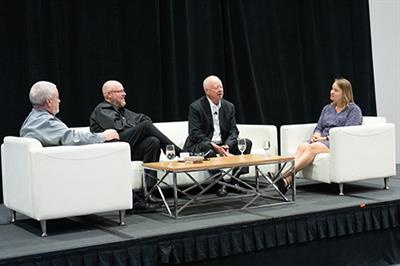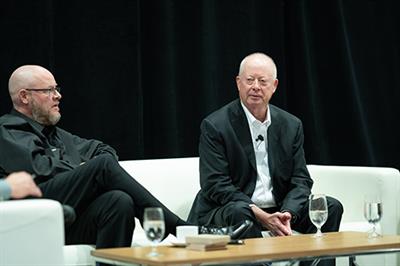 Since its conception, the term sustainability has gotten saddled with descriptors like “expensive” and “inconvenient.” Though inaccurate, it is understandable why many people think this way. For those not constantly seeking out the latest processes and technologies, it is near impossible to figure out the tangible benefits from becoming more sustainably oriented. The problem with this, fundamentally, is education. To give everyone the tools to benefit from sustainable business practices, the word must be spread that since the first major environmental push in 1970, there has been monumental progress around the return on investment of sustainability. Just use the three panelists in PRINTING United’s Sustainability Strategies Luncheon as proof.
Since its conception, the term sustainability has gotten saddled with descriptors like “expensive” and “inconvenient.” Though inaccurate, it is understandable why many people think this way. For those not constantly seeking out the latest processes and technologies, it is near impossible to figure out the tangible benefits from becoming more sustainably oriented. The problem with this, fundamentally, is education. To give everyone the tools to benefit from sustainable business practices, the word must be spread that since the first major environmental push in 1970, there has been monumental progress around the return on investment of sustainability. Just use the three panelists in PRINTING United’s Sustainability Strategies Luncheon as proof.
Dale Crownover of Texas Nameplate Co. has made an incredible example of how building a sustainable business can benefit your bottom line. Check the stats:
- Recycling 90% of water.
- Reducing VOCs by 95%.
- 95% paperless facility.
- Eliminating soiled rags, among other achievements related to solvent and acid reclamation
This shift came after 70 years of having a profit-centric business and required an investment of about $500,000. It only took two-and-a-half years for the company to see the return on investment and positively impacted profits, not only in the materials and energy saved or their increased business, but in their workforce development as well.
By 2025, millennials (like myself) will make up 75% of the workforce, and we are demanding to work for companies with sustainability in their core values. Texas Nameplate Co. has been able to attract and maintain their millennial workforce because of their strong sustainability initiatives. “It’s not about making money — it’s the right thing to do. But if you do this [run a sustainable business] you’ll make a lot more money,” said Crownover.
But it's not just the workforce: consumers, including print buyers, are also requiring sustainable practices. If you're wondering how to showcase your sustainable initiatives so that each customer can recognize them, Jenny Dela Cruz with Snowball Print Marketing recommends complete transparency. On each invoice she sends out, there is a matrix of what the project saved in terms of water, CO₂, trees, etc. This not only highlights exactly what her company is doing in the sustainability space, such as using alternative sources for paper, it is a fantastic marketing technique. It shows the customer the positive impact they were able to make while spending the same amount of money and, by that logic, the negative impact they could have had if they chose to work with someone else.
 Now, this is not to say that achieving sustainability is without complication as a circular economy will certainly require national — and global — teamwork. For instance, there is a difference between a material being theoretically recyclable vs. what is economically feasible to be recycled based on the infrastructure available to you. As Brett Thompson of Piedmont Plastics pointed out, until the proper recycling infrastructure is made readily available all over the country, focusing on the product itself may not be as impactful as trying to better the process in which it is made. This involves getting in contact with your supply chain. Thompson implored that we look at the big picture: If you are doing business with a non-sustainable company, you are still contributing to a non-sustainable supply chain. Act like a millennial on the job hunt and do not settle for a non-sustainable company for your business. Furthermore, let those that are not sustainable know why they are not getting your business. Education is key to a successful circular economy.
Now, this is not to say that achieving sustainability is without complication as a circular economy will certainly require national — and global — teamwork. For instance, there is a difference between a material being theoretically recyclable vs. what is economically feasible to be recycled based on the infrastructure available to you. As Brett Thompson of Piedmont Plastics pointed out, until the proper recycling infrastructure is made readily available all over the country, focusing on the product itself may not be as impactful as trying to better the process in which it is made. This involves getting in contact with your supply chain. Thompson implored that we look at the big picture: If you are doing business with a non-sustainable company, you are still contributing to a non-sustainable supply chain. Act like a millennial on the job hunt and do not settle for a non-sustainable company for your business. Furthermore, let those that are not sustainable know why they are not getting your business. Education is key to a successful circular economy.
Progress in the sustainability arena is happening fast, and it will only continue to gain momentum. But don’t worry, you haven’t missed out! As Dela Cruz said, “The best time to plant a tree is 20 years ago. The next best time, however, is now."
Thank you to our 2019 PRINTING United Sustainability Strategies Luncheon panelists. For more information on topics discussed, email govtaffairs@sgia.org. Be sure to also check out SGIA's Sustainable Business Recognition program, for which we are accepting applications through December 31!